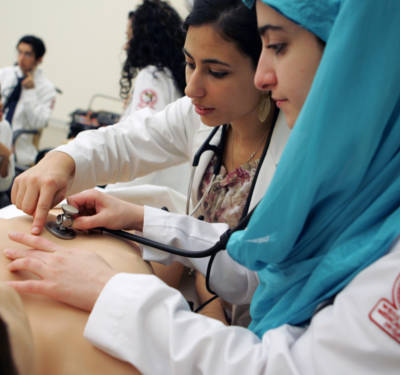Learning to work together in healthcare
Programs need to be developed that teach students of healthcare professions to work together and with patients in their future clinical settings.
Published online 30 September 2016

Students of healthcare professions need to learn new skills t.hat emphasis collaborations.
© WCMC-Q
In 2010, the World Health Organization published its “Framework for Action on Interprofessional Education and Collaborative Practice”, emphasizing the need to prepare students of healthcare-related professions for effective collaboration with others in the health workforce and with patients, families, carers and communities to deliver the highest quality of care.
This requires the development and delivery of programs that are culturally appropriate for students in various settings. In 2015, researchers in Qatar worked together to develop and implement such a program.
The team, led by Mohamud Verjee from Weill Cornell Medical College in Qatar, delivered a series of four two-day workshops over a period of six months to 58 students representing medicine, nursing, pharmacy and allied healthcare specialties in Qatar-based institutions.
The development of the workshop’s content first involved agreeing on and clearly defining four core competencies that the students would be trained on. These were role clarification, in which students develop a clear understanding and respect for the roles and responsibilities of others in the healthcare process; inter-professional communication, in which the students learn to communicate collaboratively, responsibly and in a culturally-sensitive manner; patient-centred care, in which the patient and family are engaged as part of the healthcare team; and shared decision-making, in which the students include all stakeholders in the decision-making process related to healthcare outcomes.
This was followed by developing games, unrelated to healthcare scenarios, that focused on gaining team-building and collaborative skills. One such game involved asking the students to imagine they were stranded on a desert island and decide on four things they most needed to survive. The team also developed healthcare simulations in which students acted out real-life situations. Students were asked to work together to diagnose cases using data gathering and critical thinking techniques. Lectures and discussions were interspersed throughout the workshops.
Through analyses of workshop video recordings and pre- and post-workshop surveys and focus groups, the team found statistically significant gains among the students in terms of teamwork. However, they also found the students showed a tendency to focus on solving problems at the expense of patient- and family-centred care. Student discussions revealed strongly positive learning experiences and a desire for similar workshops to be incorporated into the curricula of their undergraduate educational institutions.
“Interprofessional education enhances and benefits healthcare,” write the researchers in their study published in the Journal of Local and Global Health Science. “It should be incorporated in general healthcare training to develop positive interprofessional learning…Structured interprofessional interaction with education is an important future objective,” they conclude.
Reference
- Johnson, B. et al. Core interprofessional education (IPE) health competencies: the process of adaptation and implementation for a local environment. J. Local Glob. Health Sci. (2015) | article
DOI: 10.1038/qsh.2016.131

